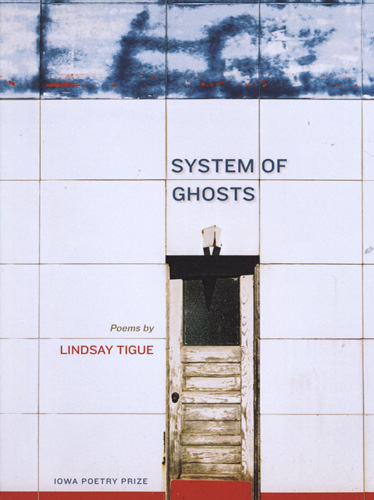System of Ghosts
In addition to traditional rain showers, April 2016 will bring the launch of Lindsay Tigue’s book of poetry, System of Ghosts, winner of the 2015 Iowa Poetry Prize. In this, her first book, Tigue has mastered a technique of taking facts—some obscure—and using them as a springboard to wherever her imagination leads her. Judge Craig Moran Teicher says these bits of information are “gathered magpielike,” leading to insight. In addition to traditional rain showers, April 2016 will bring the launch of Lindsay Tigue’s book of poetry, System of Ghosts, winner of the 2015 Iowa Poetry Prize. In this, her first book, Tigue has mastered a technique of taking facts—some obscure—and using them as a springboard to wherever her imagination leads her. of the 2015 Iowa Poetry Prize, judge Craig Moran Teicher says these bits of information are “gathered magpielike,” leading to insight.
To illustrate, Tigue writes in “Bliss,” that “In 1899, in New York City, Arthur Smith / hit H. H. Bliss, the first American pedestrian // killed by car.” This prompts:
[ . . . ] My grandmother
made me sit in the backseat.
Precious cargo, she called me,
rolling slowly over dirt roads.
Each pothole borne in my bones.
Another little known fact is that Aokigahara is Japan’s suicide forest. In “We are a System of Ghosts,” she enlightens us: “People say it’s the best place to die. [ . . . ] The bodies get cleared out once a year / by volunteers and officials.”
Showcasing Tigue’s versatility are a prose poem and a poem that’s to be read both down and across. Midway through the full-page prose poem, “Michigan Central Station has been Closed Since 1988” she writes:
I leave you and fly home in the dark to find spilled vinegar in
the kitchen and, for a moment, think it is blood. I sit on the floor looking
at the stain I’ll have to scrub best-I-can from the linoleum and I stare at
the guilty cat as he jumps from counter to floor and stumbles his landing
and licks his leg. I love to catch an animal pretending.
Try these last lines of the down-and-across poem, “My Dad’s Brother Called Every Year for Five Years then Disappeared.”
The news keeps reporting such mysteries. We’d watch for you in places, my dad pacing.
For it’s as if we’re all waiting for bodies. Be quiet, he’d whisper. Eric’s on the phone.
Continuing with her versatility, Tigue gives a mini-lesson on geology in “Convergent Boundaries” which starts out scientifically, then warms us up:
Isostatic sinking is caused by heavy weight,
as during glaciation, [ . . . ]I tell you this is my new favorite
geologic event. That I also love
subduction, when one tectonic plate sinks
below the other at convergent boundaries,
causing hot magma to rise to the surface.
When I told you about subduction,
I slipped, said seduction. That’s what
this is. But you know that.
The poem “Drop” tells us to drop what we’re doing. It also contains a stunner of a sentence. “Let’s purge / this house of knickknacks, receipts. I don’t / want to remember the missing. Most of all, / let me lose those stone-frozen eyes– / how the man I loved looked saying: I / never really wanted you.”
I especially like “Interview Practice,” which contains those routine questions we all expect and dread during a job interview. Here is Tigue handling one of them:
What do you do when
you’re disappointed/
sad/stressed?Details about planning
a future. Walks
to nowhere. Something
about wishing, but not believing
in prayer. Say
I strive for tradition. Insist
I’m made for this work.
Occasionally a poem veers into stream of consciousness. That happens. But after reading System of Ghosts, I feel Tigue is a writer whose works will gain wider attention in the future. The book, available in April, is not only pleasant reading, but it taught me a few new things.





